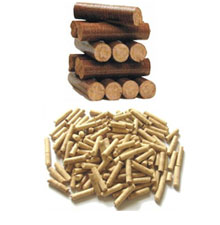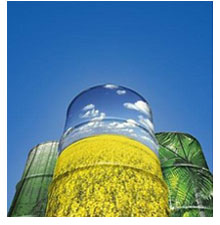Products

Biomass briquettes are larger than pellets and can be produced in different ways for better storage.

Pellets are tiny cylinders of compressed biomass. Approximately 50 mm. Their humidity is very low and they require little storage space. It is an ecologically friendly fuel of high calorific value.
Advantages
Economic:
- It is considerably cheaper than fossil fuels.
- Using pellet, the added value stays in your region, as the economy strengthens and creates new jobs.
Safety:
- No risk of explosion, is not volatile, and does not produce odors.
- The fuel is non-toxic and harmless to health.
Comfort:
- Its combustion produces little smoke.
Ecological:
- Renewable energy source: Using pellet significantly contributes to reducing the emission of greenhouse gases.
- The burning of pellets is more efficient than burning wood, and hence emissions are minimal.
- The ash is minimal due to high combustion efficiency, is completely biodegradable, and is also a good fertilizer.

These are products derived from solid biomass that are capable of direct use in energy conversion processes derived from biomass via transformations, usually physical, such as chipping, grinding and drying. Solid biofuels made from castor beans are biomass pellets and briquettes, the combustion of these is used to generate heat or steam in heating homes and producing electricity in combined heat and power. The production of electricity from renewable sources of biomass does not contribute to the greenhouse effect as carbon dioxide released by burning biomass is equal to the carbon dioxide absorbed by the biomass during its growth.

The combination of organic oils and alcohol. The production of biodiesel has the potential to replace significant amounts of fossil fuels in various transportation applications.

Castor oil has multiple uses. Because it retains its viscosity at high temperatures and can withstand very low temperatures without freezing, castor oil is ideal for use in high revolution motors. The refined oil is used in cosmetics and medicinal products. Sulfonated oil is used in the textile industry. Dehydrated, it is the basis for the preparation of brake fluids and paints. Dissolved in alcohol, it is used in the manufacture of lotions and perfumes. With high temperature fusion with caustic soda, it is used in making plastics and nylon and also used in the industries of rubber, waxes, artificial leather, and as an insulator.





